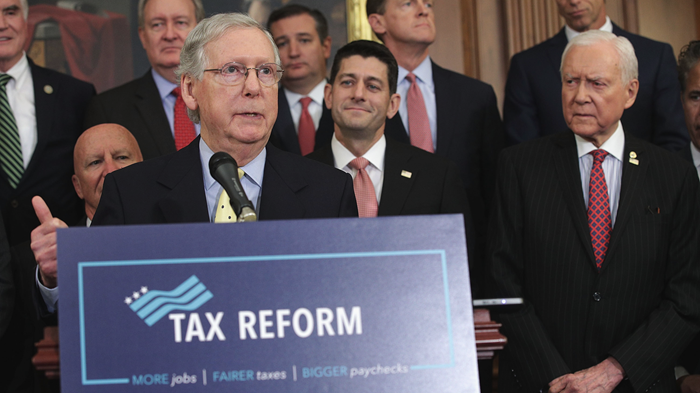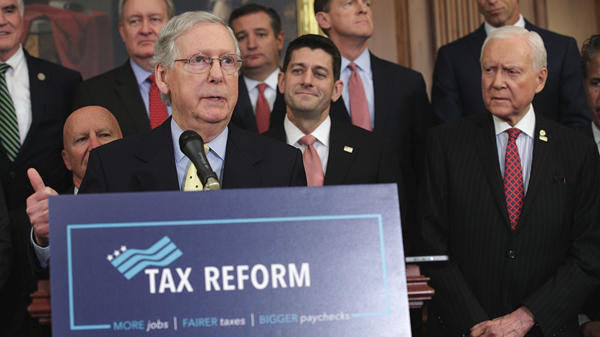

Taxes are more commonly associated with death than life, but the long-awaited Republican tax bill includes a new provision celebrated by expectant pro-life parents for recognizing their belief that life begins at conception.
Under the proposed reform plan released this week, “nothing shall prevent an unborn child from being treated as a designated beneficiary” of a 529 college savings account, GOP lawmakers wrote.
Pro-life advocates see the move as federal acknowledgement of a baby’s life prior to its birth. (Under the current tax code, a person must have a Social Security number in order to be a 529 beneficiary, and babies are not assigned a number until after they are born.)
Christian pro-life leaders disagreed somewhat over the extent to which the language furthers the pro-life cause; March for Life president Jeanne Mancini called it a “huge leap forward for an antiquated tax code,” while Susan B. Anthony List spokesperson Mallory Quigley said it’s a “a small increment in the momentum that we’re building to ensure that one day every child is welcomed and protected under the law.”
Mancini also said, “We hope this is the first step in expanding the child tax credit to include unborn children.”
March for Life Action said that the change was not something the group had lobbied for. Pro-choice groups including NARAL Pro-Choice America criticized the move as ideologically driven, backwards, and nonsensical.
CBN reported that the Department of Health and Human Services (HHS) also recently acknowledged life in the womb in its strategic plan starting in 2018, which states that HHS “accomplishes its mission through programs and initiatives that cover a wide spectrum of activities, serving and protecting Americans at every stage of life, beginning at conception.”
The new tax plan also drew attention from Christians over its proposed elimination of the adoption tax credit and repeal of the Johnson Amendment, as President Donald Trump had pledged.
Most parents who adopt children domestically or internationally are currently eligible for a tax credit (up to $13,570 in 2017) under an incentive created over 20 years ago and adjusted annually for inflation, according to a Vox analysis of the program.
Christian groups including the Ethics and Religious Liberty Commission (ERLC) of the Southern Baptist Convention have spoken out in defense of the credit, calling it a pro-life and pro-family federal measure.
“The Adoption Tax Credit made it possible for us to adopt,” tweeted Nate Pyle, pastor of Christ’s Community Church in Fishers, Indiana. “This cut will lead to less adoptions. In the end, this move hurts kids.”
An ERLC email sent this week stated:
The adoption tax credit, like many other tax credits, would be eliminated under the proposal released yesterday. It is true that there is an increase to the child tax credit, a new family tax credit, and an overall decrease in tax rates. These policy proposals will work to lower the tax burden for most American families.
But these proposals don’t and can’t replace the adoption tax credit. By eliminating the adoption tax credit, the tax reform proposal would make adoption more expensive for most families, even if their tax burden is less over time.
Focus on the Family president Jim Daly applauded the tax reform effort overall, including tax cuts for the middle class. But he stated, “I’m deeply concerned to learn that the current bill eliminates the adoption tax credit. We shouldn’t be placing the burden of these tax cuts on orphan children.”
Michael Wear, a former faith adviser under President Barack Obama, championed the adoption tax credit as a smart policy with bipartisan support, arguing that it is better—financially and morally—to have children adopted into families than to raise them in state custody.
Christians also noted that Republican tax reform efforts also address Trump’s longstanding promise to repeal the Johnson Amendment provisions, which restrict leaders of 501(c)3 nonprofits—like pastors of churches—from endorsing candidates in their official capacity.
“I’m excited about the Johnson Amendment being put in there that will address the rights of churches and nonprofits to be able to speak without losing their tax exempt status,” Georgia congressman Jody Hice told CBN News.
Though the tax plan does not allow for churches to make political contributions to campaigns, the bill states they will not be penalized “solely because of the content of any homily, sermon, teaching, dialectic, or other presentation made during religious services or gatherings.”
As CT has previously reported, the Internal Revenue Service (IRS) has not typically enforced this measure; in fact, more than 1,000 pastors flagrantly violate the provision each year by preaching politics on Pulpit Freedom Sunday.
Regardless of its legality, most American evangelicals do not want their pastors endorsing candidates from the pulpit. In a LifeWay Research survey conducted a year ago, nearly three-quarters of evangelicals said they should abstain.

Support Our Work
Subscribe to CT for less than $4.25/month


















